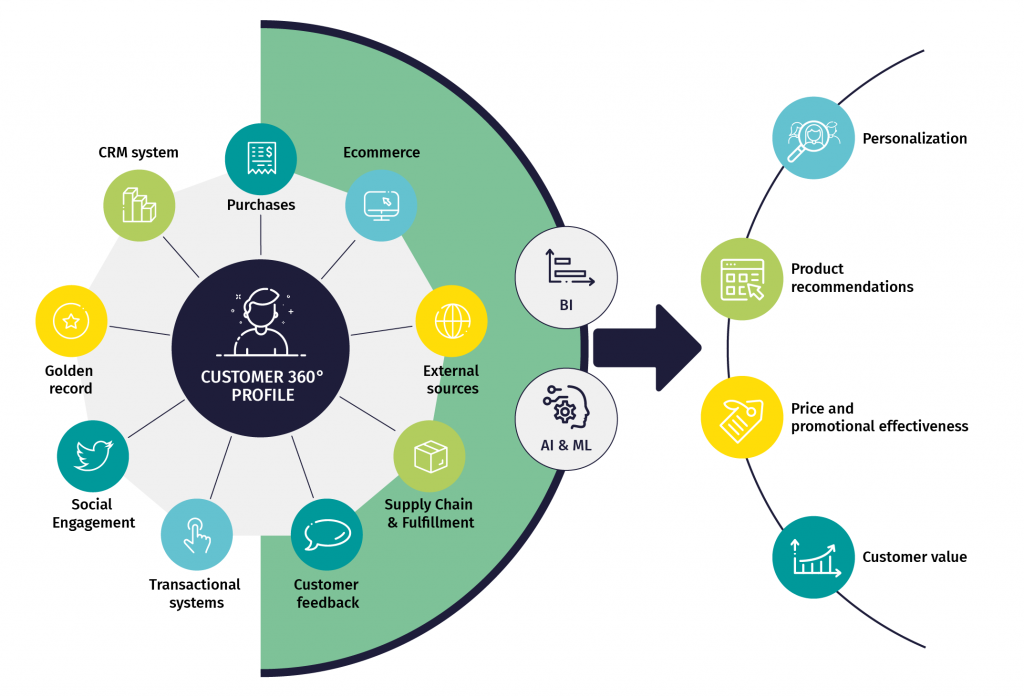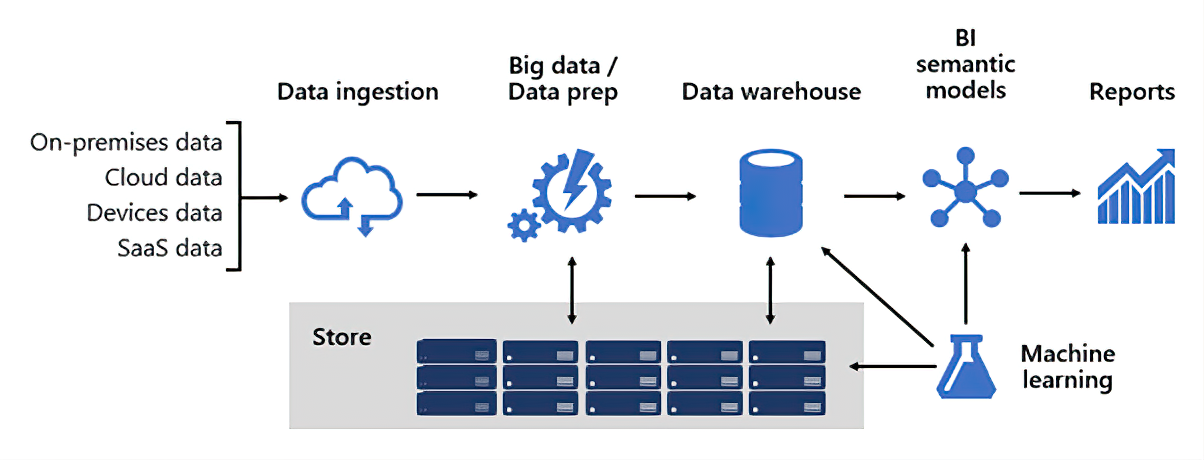Modern Analytical Platform as a response to the rapidly growing e-commerce market
18 January 2021
Covid-19 pandemic has changed the rules of the business game in many aspects. 2020 will be remembered in history as a year that shook us at all levels: social, environmental and economic.
The virus set new rules in the sphere of life and business, requiring us to quickly adapt to them. This is possible thanks to the introduction of the digital transformation processes.
The current approach to various types of projects ceases to work in a world where a significant part of the business has moved to the Internet, and the environment requires a complete change in the handling of business processes. An area particularly affected by the change is the e-commerce market.
“As a result of the pandemic, in 2020 the e-commerce market in Poland will record the highest growth in several years (almost 26% y / y). Online commerce has benefited greatly from the pandemic and the restrictions introduced to limit its development. Shops and shopping platforms recorded significant increases in sales, and many chains of stationary stores made decisions to launch their own e-stores. “
Source: newseria.pl
Companies that have been basing their profits on brick-and-mortar stores are suddenly faced with increasing e-commerce profits. Entering a new area means that the existing processes are not fully optimized and effective.
Even if companies used analytics to track sales trends or analyze changes in the market – in the world of e-commerce it is no longer enough. In order to get the full picture of the business, it was necessary to analyze the information coming from new sources, e.g., from social media, or the trends of inquiries in websites.
As part of the digital transformation in the organization, modern analytical methods are becoming the ultimate answer. Data insights can form the basis for decision-making or contribute to increasing the rate of return on marketing campaigns. Data is used to build a competitive advantage.
The basis is the skillful use of all the data we have, including unstructured data from all available sources, the so-called Big Data. For example, analyzing log files from the website verifies interest in our marketing campaign in real time. The key assumption is: all data has potential value.
Know your customer!
Currently, the interaction between the customer and the seller takes place through several, and sometimes over a dozen, information channels. Knowing which trades belong to which client and being able to identify all sources is a challenge. To solve this problem, we need to collect the right data. Thanks to the analytical platform, we are able to collect sales data from all sales channels, data from marketing campaigns, loyalty programs, customer surveys or complaints.
After getting to know the data thoroughly, we can also make corrections to the systems from which the data come from or extend the scope of information to new areas, e.g. demographic or weather data.

Source: Personalization Pulse Check | Accenture and The Power of Brand Purpose | Accenture
Using algorithms, we can create the so-called ‘golden record’, i.e. a unique record identifying a specific customer. We can use cross-sectional data for 360 customer analytics and capture information about purchase preferences, purchase history, or purchase patterns, regardless of where these interactions took place.
Next, we can use the data to categorize customers by segregating them into similar groups (segmentation). Having segmented customers, we can prepare offers tailored to their preferences and attributes. We can plan marketing campaigns directly targeted at dedicated customer groups. The more data we collect, the more effective the segmentation algorithms will be, which increases the chances of increasing sales.
Another aspect is building information about your customer’s order. Analyzing the customer’s historical data in order to determine what % of our customers come back to us in what period helps understand who the customer is (segment) and why he/she came back (price, product, promotion, service). The quality of service influence final satisfaction and successive purchases (brand loyalty).
Customer loyalty is also measure of information on the disappearance of his sales (or on the other hand, the purchase by him). It is often referred to as the departure or loss of the client as customer churn. Using machine learning, we can predict the likelihood of customer churn. We can find out what aspects affect the customer’s decision. Enriched with knowledge, we can try to prevent the customer leaving.
Assortment optimization
Another area where advanced analysis can contribute to increased efficiency is optimization of warehouse resources and distribution of goods. Consider the situation when we are running out of product in stock. We did not anticipate that the demand for it would increase so much. Unfortunately, in a situation where the goods are missing and we cannot sell them, we will simply lose income. On the other hand, the longer an item remains in stock, the more we pay for its storage.
Optimizing these processes is of key importance. E-commerce companies should build the ability to accurately analyze the demand for goods. On this basis, we should be able to determine the safe stock of a specific product and, in the event of approaching its limit quantity, propose a warehouse supply.
Tools based on Artificial Intelligence are used for detailed forecasting of the demand for groups of goods or individual products. Additionally, we can look for a correlation between historical sales and its external conditions. Such solutions help to determine which goods to store in which of the warehouses and offer an approximate number of sales per item. Thanks to this, we can minimize the delivery time, which can significantly translate into the level of customer satisfaction.

Real-time analytics
Decision-making time is a key success factor in an industry as competitive as e-commerce. In order to be able to quickly adjust your offer to the customer’s needs and react to changes in the environment, effective business processes and tools are necessary. Thanks to the computing power of cloud services, data can be obtained in almost real time. A tool supported by Artificial Intelligence algorithms helps us to forecast:
- What are the key purchasing trends?
- What are the customer’s purchasing patterns?
- How to assign a customer to the correct segment?
- Will I determine the best price that will attract the customer?
- Which marketing campaigns are more effective?
- How are we doing compared to the competition?
- How satisfied are our customers?
- How do clients say about us in social media?
The answers to the above questions will allow you to successfully compete on the very competitive e-commerce market. In order to use the power of Big Data and obtain information in near real time, companies should invest in cloud-based Modern Analytical Platforms.
Example of implementation
Elitmind implemented the Modern Analytical Platform for several clients from different sectors. The latest implementation for Retail sector was made for CCC Company . The company has decided that it will build the foundation for an even more effective data-driven operations and a data-driven decision-making culture.
The client decided to build the “omnichannel“ marketing platform capable of creating a common offer for all sales channels: from a stationary store, through mobile access, to e-commerce. It doesn’t matter if the customer reaches for a smartphone while shopping, turns on the computer or goes to the shopping mall. The same individually prepared offer is waiting for him everywhere. The client decided to use Microsoft Azure, a cloud analytical platform that will be able to process data from multiple channels simultaneously in real time.
The goal of the project was to build the Modern Data Warehouse as a reliable source of reporting (one source of truth), advanced analysis, capable of conducting operational activities and making strategic decisions in the areas of all key business processes, including: purchasing, sales, logistics, complaints. The client has gained modern tools, thanks to which he has the ability to direct marketing campaigns to users almost in real time and adapt to changing purchasing behavior. As a result, it significantly increased the chances of more effective sales of products.

Source: Microsoft Azure
The growing competition in the Retail industry, particularly in e-commerce, has brought many new challenges and problems. Fortunately, there are companies that implement tools that help build a competitive advantage in this new balance of power.
At Elitmind, we carry out both Analytical Platform implementation projects, as well as support our clients in developing the best, tailored to their needs, approach to analytics strategy and the architecture of the analytical environment. It enables both operational reporting on the company’s current activities, the use of Artificial Intelligence for more advanced analyzes, while being a working environment for analysts.
Key takeaways:
- “As a result of the pandemic, in 2020 the e-commerce market in Poland will record the highest growth in several years (almost 26% y / y). Online commerce has benefited greatly from the pandemic and the restrictions introduced to limit its development. Shops and shopping platforms recorded significant increases in sales, and many chains of stationary stores made decisions to launch their own e-stores. ”
- As part of the digital transformation in the organization, modern analytical methods are becoming the key. Data insights can form the basis for decision-making or contribute to increasing the rate of return on marketing campaigns. Data is used to build a competitive advantage.
- Decision-making time is a key success factor in an industry as competitive as e-commerce. In order to be able to quickly adjust your offer to the customer’s needs and react to changes in the environment, effective business processes and tools are necessary.
- The growing competition in the Retail industry, in particular in e-commerce, has brought many new challenges and problems. Fortunately, there are companies that implement tools that help build a competitive advantage in this new balance of power.
- Elitmind is a leading company that implements analytical projects based on the cloud technology. We work with companies that have built or want to build a work culture based on data values. What counts for our clients is not only the final product, but also the speed of implementation and flexibility. With the help of highly qualified experts, we carry out implementation projects by providing analytical tools and data platforms.
